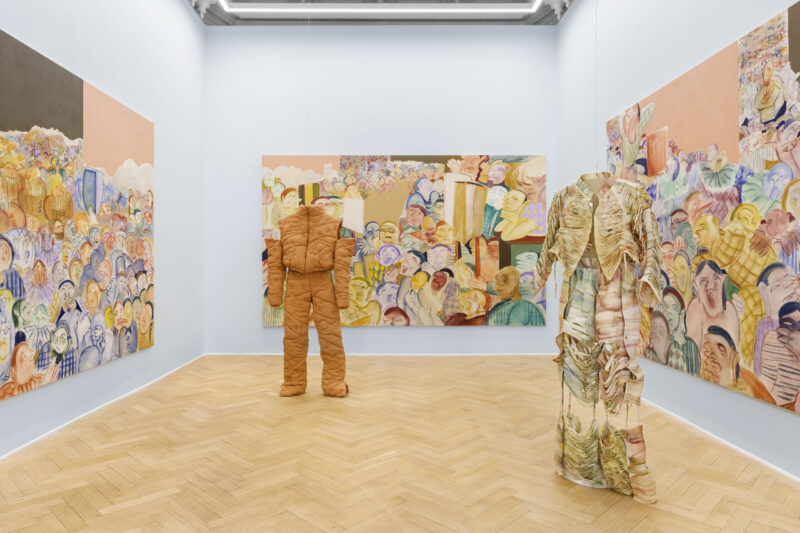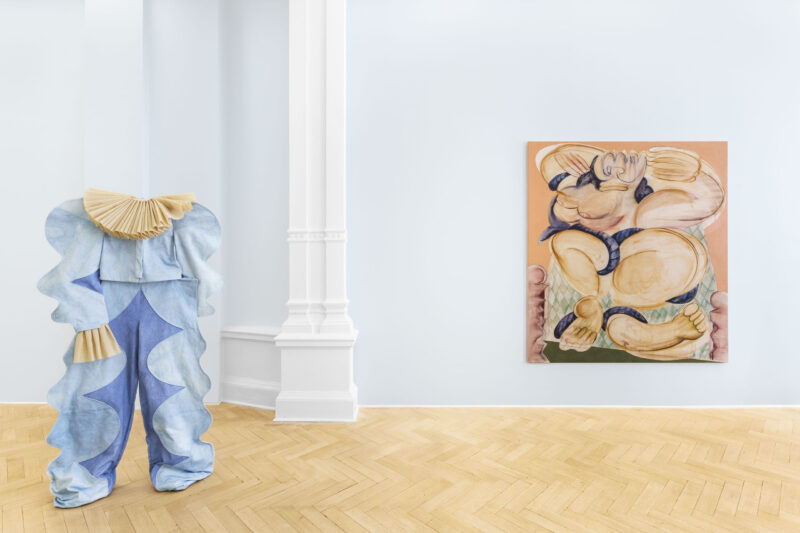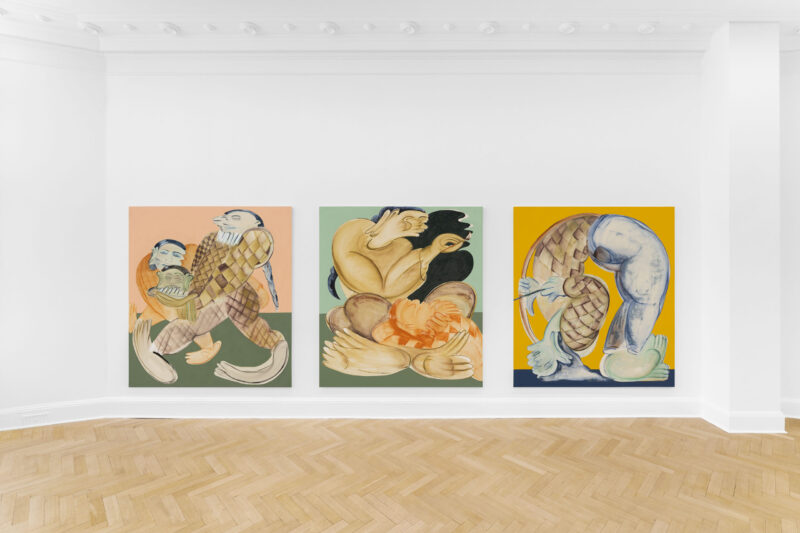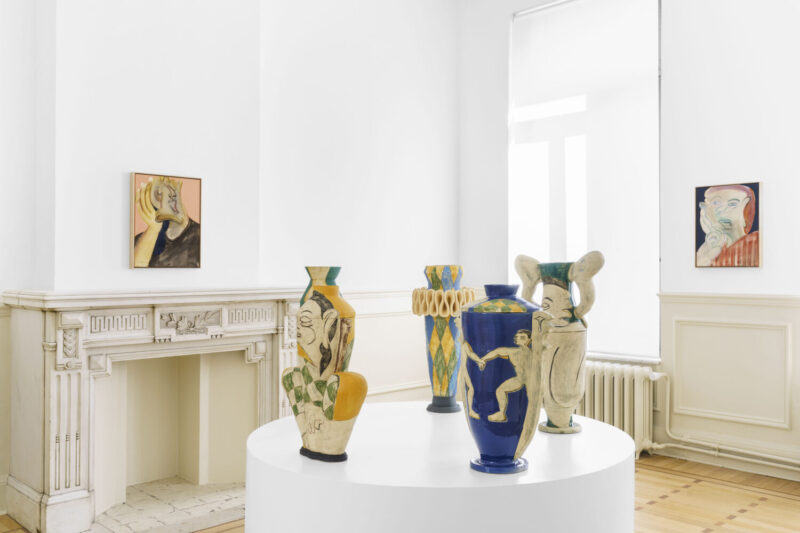by Adela Lovric // June 25, 2024
Anastasia Bay’s evocative paintings come to life through gestures of summoning. At the Brussels gallery Sorry We’re Closed, the artist presents ‘Maestra Lacrymae,’ a body of work that takes the form of an exhibition opera. This unusual crossover of visual art and operatic elements invokes a host of historical references and allusions to contemporary parallels. Most prominently, a triptych revisited three times on the gallery’s ground floor cites James Ensor’s monumental, over four-meter-wide ‘Christ’s Entry into Brussels in 1889’ (1888). Supposedly a celebration of Christ’s triumphant entry into Jerusalem in his final days (now celebrated among Christians as Palm Sunday), this canonical post-Impressionist painting depicts a colourful carnival procession with a grotesque and layered twist. It collapses nearly all the antagonisms dividing Belgium at the end of the 19th century—class conflicts, universal suffrage, secularization, struggles for social justice and cultural and linguistic identity—into a single event, revealing the interconnected nature of the societal tensions of the time. A similar idea of a massive tide of change is present in Bay’s work, along with the suggestion that the viewer cannot escape it.

Anastasia Bay: ‘Maestra Lacrymae,’ 2024, exhibition view at Sorry We’re Closed, Brussels // Photo © Hugard & Vanoverschelde
Crowded with distorted human figures marching through the streets, the colourful triptych surrounds and pulls the viewer into its insurrectionary momentum. While the depicted masses seemingly entrap the gallery visitor, swarming on all sides toward them, they apppear benevolent, even with their twisted Picasso-esque expressions. The muted palette that ranges from pastels to various shades of brown, paired with cartoonishly flattened and softened shapes, subdues tension in the scene. Nothing decidedly spells out a riot; even the banners carried by a few figures are completely blank. Whether the scene is more of a party or a protest, and whether it is to be celebrated or feared, largely depends on the viewer’s point of view. The masses can be seen as a violent mob, a powerful uprising of the people, or a jubilant parade, with these interpretations seeming to be purposefully blurred.

Anastasia Bay: ‘Maestra Lacrymae,’ 2024, exhibition view at Sorry We’re Closed, Brussels // Photo © Hugard & Vanoverschelde
The triptych assembles the characters central to Bay’s work: popular figures, singers, acrobats, archers and troublemakers, all navigating public spaces. Five characters are extracted from the crowd—Golem, Artemis, Dibutades, Penelope and Harlequin—and represented through costumes suspended in the exhibition room. Poised to come to life, they enhance the impression of a ghostly presence that likewise appears to haunt the large canvases. Through these costumes designed by Lily Sato, Camille Lamy and Sara Daniel, as well as Joseph Schiano di Lombo’s music composition and libretto in five acts that accompany the show, Bay’s primary medium of painting engages in a dialogue with opera and its ancestors—medieval masquerade and classical Greek and Roman drama.

Anastasia Bay: ‘Maestra Lacrymae,’ 2024, exhibition view at Sorry We’re Closed, Brussels // Photo © Hugard & Vanoverschelde
Scattered across the three floors of the gallery are portraits of figures emblematic of Bay’s painterly world. With warped physiques and blurred faces, as if captured mid-metamorphosis into chimeras of past and future selves, these characters narrate the show’s story of upheaval and transformation. In two of the paintings, the depiction of a head on a platter evokes the biblical tale of Salome’s execution of John the Baptist and its artistic interpretations, as well as guillotine beheadings during the French Revolution. In addition to paintings, five amphora-shaped sculptures overwrite the ancient Greek and Roman legacy with that of the 16th-century commedia dell’arte. The latter is summoned via the rebellious figure of Harlequin, a boundary-crosser who playfully disobeys rules and conventions.

Anastasia Bay: ‘Maestra Lacrymae,’ 2024, exhibition view at Sorry We’re Closed, Brussels // Photo © Hugard & Vanoverschelde
As part of the exhibition program that extends beyond the gallery, Bay and Schiano di Lombo staged a performance, ‘La Fievre Quinte,’ at the Bozar art center in Brussels. Wearing costumes that were exhibited at Sorry We’re Closed, a group of performers took off from the gallery to the streets in an ad lib masquerade, together with the visitors who covered their faces with Bay’s Baconian paper masks, using public space as their stage for instigating minor acts of disobedience. The final destination for the unruly crowd was Bozar. Once inside, the performers gathered in front of the replica of Ensor’s ‘Christ’s Entry into Brussels in 1889,’ which was displayed as part of an exhibition commemorating the 75th anniversary of the artist’s death. At Bozar’s Rotonde Bertouille, Schiano di Lombo held a concert of his original songs that animate the flamboyant characters of Bay’s exhibition opera.
Amassing an army of rebellious archetypes, artistic frameworks and moral lessons of the past, ‘Maestra Lacrymae’ gently rocks the audience out of the contemporary condition of perpetual ironic detachment. Bay and her collaborators create a setup for a multi-sensory experience, which hides a revolutionary spark under the delightfully whimsical surface. “[T]hese characters seem to be there to shake the world, without moving that much,” as Schiano di Lombo notes in an interview. While the walls continue to close in on the artists in today’s so-called free world, ‘Maestra Lacrymae’ reasserts their role in the society as the shapeshifting tricksters whose greatest trick remains speaking truth to power.
Exhibition Info
Sorry We’re Closed
Anastasia Bay: ‘Maestra Lacrymae’
Exhibition: Apr. 11-July 6, 2024
sorrywereclosed.com
Rue des Minimes 39, 1000 Brussels, Belgium, click here for map



















